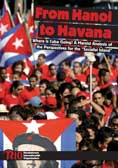




 The development of China since the early 1990s shows clearly that capitalism can be restored in a degenerate workers’ state without major changes to the political regime. It is noteworthy that the official Cuban press still refers to China as socialist, even though 2/3 of the country’s millionaires (and there are many!) are members of the Communist Party of China. More importantly, the entire economy with few exceptions is dominated by the laws of the market. China’s “economic miracle” has been based on the super-exploitation of hundreds of millions of peasants herded into the cities to work as cheap labor for multinational corporations.
The development of China since the early 1990s shows clearly that capitalism can be restored in a degenerate workers’ state without major changes to the political regime. It is noteworthy that the official Cuban press still refers to China as socialist, even though 2/3 of the country’s millionaires (and there are many!) are members of the Communist Party of China. More importantly, the entire economy with few exceptions is dominated by the laws of the market. China’s “economic miracle” has been based on the super-exploitation of hundreds of millions of peasants herded into the cities to work as cheap labor for multinational corporations.
A closer comparison to Cuba can be found in Vietnam or Laos, where capitalism was also re-introduced in the early 1990s even though these countries are still ruled by “Communist Parties”. Since these countries lack China’s vast working class and internal market, they are poorer still: multinational corporations are moving production from China to Vietnam to get even cheaper wage labour. Sections of the Cuban bureaucracy praise Vietnam as a model for their country, for example the economist Omar Everleny from the University of Havana: “A certain amount of market is necessary for the development process in the conditions of Cuba. Vietnam has managed to introduce an economy with high rates of growth and growing welfare, and today it can compete with the primary exporters of basic products in the world.”[46]
The problem is, of course, that these declarations were made right before the outbreak of the world economic crisis which hit Vietnam with particular furor. In 2008, the number of people in Vietnam without enough to eat almost doubled[47] – and the wage level was roughly half of that in China[48]. There should be no illusions about the plans of Cuba’s exile bourgeoisie, waiting in Miami like vultures, to transform the island back to a US colony: the consequences of a re-introduction of capitalism in Cuba would be even more devastating than in Vietnam.
Large sections of the Cuban bureaucracy are not satisfied being mere managers of the means of production, since they can lose their privileges on the whim of a superior and they cannot transfer privileges directly to their children. They want to be genuine owners, as their Chinese or Vietnamese counterparts have become. However, there are multiple obstacles for this restorationist wing of the Cuban bureaucracy. Firstly, there is the enormous pressure of US imperialism. The bureaucracy fears that if they open up the country to foreign capital too much, they will be swept away by US capital and gusanos[49] returning from Miami. Secondly, there is the world economic crisis which is not only hitting Cuba hard but makes privatization increasingly unattractive in the current market conditions. Thus, the bureaucracy is trying to open the island to the international market very slowly, via relations with China, Brazil, the European Union, Canada etc.
Notes:
46. Gerardo Arreola: “Cuba requiere ‘soltar todas las fuerzas productivas’”. La Jornada. March 17, 2008. México D.F.
47. Martha Ann Overland: “Vietnam’s Troubled Economy”.
48. Alexander Jung/Wieland Wagner: “Die Karawane zieht weiter: China will nicht länger die Billigfabrik der Welt sein”. Spiegel Special. #3. Hamburg 2008. P. 68-75.
49. Literally: “worms”. Castro’s term for the exiles.
Leave a Reply
